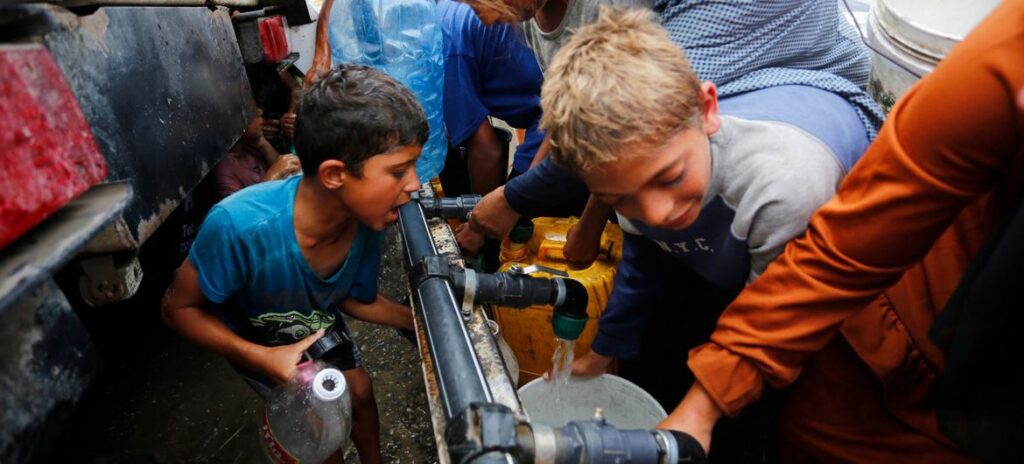Gazans Need Polio Vaccines Amid ‘Deathly Cycle’ of Hunger, Heat and Disease, Say UN Aid Agencies
UNITED NATIONS, 5 Aug 2024
Daniel Johnson | UN News – TRANSCEND Media Service
30 Jul 2024 – In a bid to prevent a polio epidemic in Gaza, UN humanitarians today repeated continuing international calls for a ceasefire to allow a mass vaccination campaign to get underway.
Almost 10 months of war and intense Israeli bombardment have shattered healthcare in Gaza and disrupted routine inoculation rounds for youngsters, leaving them exposed to a range of preventable diseases including polio, which the UN World Health Organization (WHO) confirmed had been identified last month in several sewage samples taken from Gaza.
Safe access call
Speaking to journalists in Geneva, WHO spokesperson Christian Lindmeier said that a ceasefire would be “the best” solution, before calling at the very least for the enclave’s roads to be kept clear and for safe access for medical and other relief supplies. “Otherwise, the vaccines would be sitting as many other trucks are across the border, either on the Rafah side or at the other checkpoints either inside…or outside Gaza,” he said, a week since the UN health agency announced that it was sending one million polio vaccines to the Strip.
No cases of paralysis have been reported so far, according to WHO.
If a child receives the full course of vaccines, the risk of contracting paralyzing polio is “negligible”, said UN Children’s Fund (UNICEF) spokesperson James Elder. He insisted that vaccination rates had been “very high” before war erupted in response to Hamas-led terror attacks on multiple targets in southern Israel which left some 1,250 dead and more than 250 taken hostage. “But the mass displacement, the decimation of health infrastructure, the horrendously insecure operating environment, they all make it much, much more difficult, hence putting more and more children at risk,” he said, adding that vaccination coverage was now at around 89 per cent – “hence you’ve got this increased risk for children”.
Water emergency
Condemning the reported destruction last week of a key water treatment station in the southern city of Rafah, Mr. Elder underscored the additional health dangers this had created for Gazans, now that it had been “blown up…It is yet another grim reminder of these assaults on families who are already in desperate need of water,” he said.
Today across Gaza, average water availability has fallen to between two and nine litres per person, per day, whereas the minimum should be 15 litres, Mr. Elder continued. “Somehow people are holding on, but of course we are now in that deathly cycle whereby children are very malnourished, there is immense heat, there is lack of water, there’s a horrendous lack of sanitation and that’s the cycle. On top of that, of course, there is a very, very active conflict.”
Meanwhile, Gaza’s solid waste management system has collapsed, the UN Development Progamme (UNDP) warned in a new assessment published on Tuesday. There is no access to major landfills, and waste is accumulating at more than 140 temporary dumping sites, the agency said, which is posing serious environmental and health risks, including a spike in diarrhoeal illness and acute respiratory infections.
The UN agency that assists the Palestinian people, UNRWA, also said that between 800 to 1,000 new hepatitis A cases are being reported weekly from its health centres and shelters across Gaza, with the lack of water, sanitation and hygiene speeding the spread of diseases.
Key cities targeted for evacuation
In its latest update issued Monday evening, the UN aid coordination office, OCHA, said that more than 200,000 people in Gaza – nine per cent of the population – have been forcibly displaced by Israeli evacuation orders.
Directives issued by the Israeli authorities on Saturday and Sunday impacted Rafah, Khan Younis and Deir Al-Balah “where a combined 56,000 people had been sheltering”, OCHA said, before warning that the development comes “at a time when water, sanitation and hygiene conditions are being further eroded in Gaza, with infectious diseases on the rise”.
Tags: Crimes against Humanity, Epidemics, Gaza, Genocide, Human Rights, Hunger, Israel, Palestine, Polio, UN Relief and Works Agency UNRWA, United Nations, Vaccines, WHO, War crimes, Water, Water Rights
DISCLAIMER: The statements, views and opinions expressed in pieces republished here are solely those of the authors and do not necessarily represent those of TMS. In accordance with title 17 U.S.C. section 107, this material is distributed without profit to those who have expressed a prior interest in receiving the included information for research and educational purposes. TMS has no affiliation whatsoever with the originator of this article nor is TMS endorsed or sponsored by the originator. “GO TO ORIGINAL” links are provided as a convenience to our readers and allow for verification of authenticity. However, as originating pages are often updated by their originating host sites, the versions posted may not match the versions our readers view when clicking the “GO TO ORIGINAL” links. This site contains copyrighted material the use of which has not always been specifically authorized by the copyright owner. We are making such material available in our efforts to advance understanding of environmental, political, human rights, economic, democracy, scientific, and social justice issues, etc. We believe this constitutes a ‘fair use’ of any such copyrighted material as provided for in section 107 of the US Copyright Law. In accordance with Title 17 U.S.C. Section 107, the material on this site is distributed without profit to those who have expressed a prior interest in receiving the included information for research and educational purposes. For more information go to: http://www.law.cornell.edu/uscode/17/107.shtml. If you wish to use copyrighted material from this site for purposes of your own that go beyond ‘fair use’, you must obtain permission from the copyright owner.
